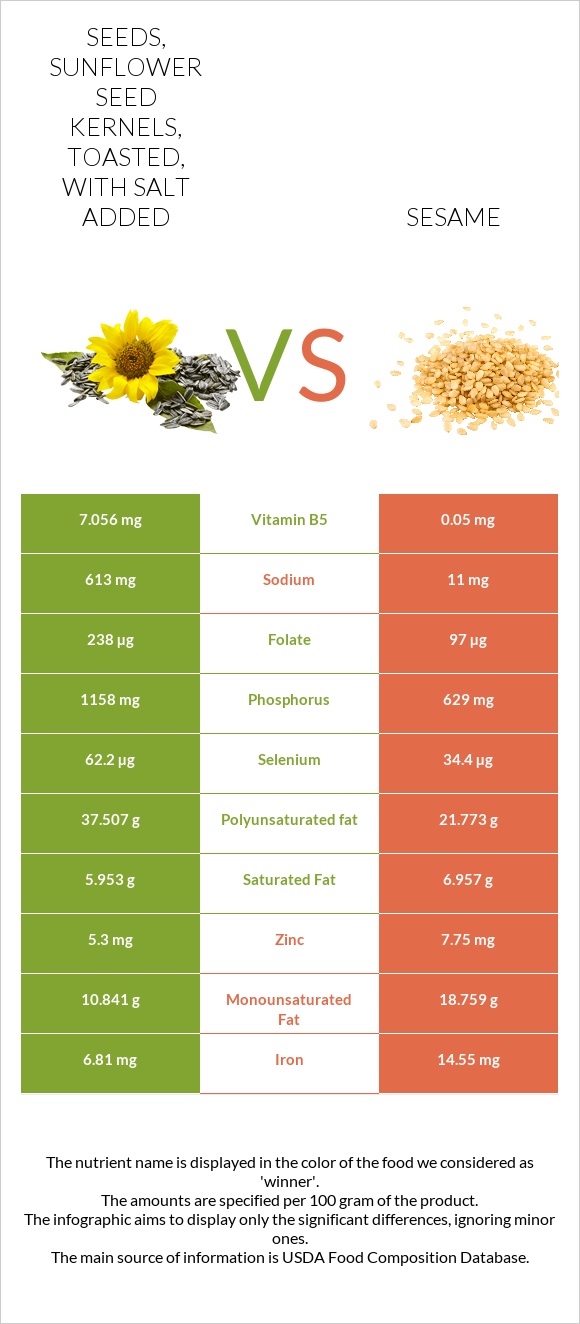Seeds, sunflower seed kernels, toasted, with salt added vs. Sesame — In-Depth Nutrition Comparison
Compare
Important differences between seeds, sunflower seed kernels, toasted, with salt added and sesame
- Seeds, sunflower seed kernels, toasted, with salt added has more vitamin B5, phosphorus, selenium, and folate; however, sesame has more copper, iron, calcium, magnesium, and vitamin B1.
- Sesame's daily need coverage for copper is 250% more.
- Seeds, sunflower seed kernels, toasted, with salt added has 141 times more vitamin B5 than sesame. Seeds, sunflower seed kernels, toasted, with salt added has 7.056mg of vitamin B5, while sesame has 0.05mg.
- Sesame is lower in sodium.
The food varieties used in the comparison are Seeds, sunflower seed kernels, toasted, with salt added and Seeds, sesame seeds, whole, dried.
Infographic

Infographic link
Mineral Comparison
Mineral comparison score is based on the number of minerals by which one or the other food is richer. The "coverage" charts below show how much of the daily needs can be covered by 300 grams of the food.
| Contains more PhosphorusPhosphorus | +84.1% |
| Contains more SeleniumSelenium | +80.8% |
| Contains more MagnesiumMagnesium | +172.1% |
| Contains more CalciumCalcium | +1610.5% |
| Contains more IronIron | +113.7% |
| Contains more CopperCopper | +122.6% |
| Contains more ZincZinc | +46.2% |
| Contains less SodiumSodium | -98.2% |
| Contains more ManganeseManganese | +16.4% |
Vitamin Comparison
Vitamin comparison score is based on the number of vitamins by which one or the other food is richer. The "coverage" charts below show how much of the daily needs can be covered by 300 grams of the food.
| Contains more Vitamin CVitamin C | +∞% |
| Contains more Vitamin B2Vitamin B2 | +15.4% |
| Contains more Vitamin B5Vitamin B5 | +14012% |
| Contains more FolateFolate | +145.4% |
| Contains more Vitamin B1Vitamin B1 | +143.4% |
All nutrients comparison - raw data values
| Nutrient |  |
 |
DV% diff. |
| Copper | 1.834mg | 4.082mg | 250% |
| Vitamin B5 | 7.056mg | 0.05mg | 140% |
| Polyunsaturated fat | 37.507g | 21.773g | 105% |
| Iron | 6.81mg | 14.55mg | 97% |
| Calcium | 57mg | 975mg | 92% |
| Phosphorus | 1158mg | 629mg | 76% |
| Magnesium | 129mg | 351mg | 53% |
| Selenium | 62.2µg | 34.4µg | 51% |
| Vitamin B1 | 0.325mg | 0.791mg | 39% |
| Folate | 238µg | 97µg | 35% |
| Sodium | 613mg | 11mg | 26% |
| Zinc | 5.3mg | 7.75mg | 22% |
| Monounsaturated fat | 10.841g | 18.759g | 20% |
| Manganese | 2.114mg | 2.46mg | 15% |
| Fats | 56.8g | 49.67g | 11% |
| Choline | 25.6mg | 5% | |
| Saturated fat | 5.953g | 6.957g | 5% |
| Vitamin B2 | 0.285mg | 0.247mg | 3% |
| Calories | 619kcal | 573kcal | 2% |
| Vitamin C | 1.4mg | 0mg | 2% |
| Vitamin E | 0.25mg | 2% | |
| Vitamin B3 | 4.198mg | 4.515mg | 2% |
| Protein | 17.21g | 17.73g | 1% |
| Carbs | 20.59g | 23.45g | 1% |
| Potassium | 491mg | 468mg | 1% |
| Fiber | 11.5g | 11.8g | 1% |
| Vitamin B6 | 0.805mg | 0.79mg | 1% |
| Net carbs | 9.09g | 11.65g | N/A |
| Sugar | 0.3g | N/A | |
| Tryptophan | 0.263mg | 0.388mg | 0% |
| Threonine | 0.702mg | 0.736mg | 0% |
| Isoleucine | 0.861mg | 0.763mg | 0% |
| Leucine | 1.254mg | 1.358mg | 0% |
| Lysine | 0.708mg | 0.569mg | 0% |
| Methionine | 0.374mg | 0.586mg | 0% |
| Phenylalanine | 0.883mg | 0.94mg | 0% |
| Valine | 0.994mg | 0.99mg | 0% |
| Histidine | 0.477mg | 0.522mg | 0% |
Macronutrient Comparison
Macronutrient breakdown side-by-side comparison
Protein:
17.21 g
Fats:
56.8 g
Carbs:
20.59 g
Water:
1 g
Other:
4.4 g
Protein:
17.73 g
Fats:
49.67 g
Carbs:
23.45 g
Water:
4.69 g
Other:
4.46 g
| Contains more FatsFats | +14.4% |
| Contains more CarbsCarbs | +13.9% |
| Contains more WaterWater | +369% |
~equal in
Protein
~17.73g
~equal in
Other
~4.46g
Fat Type Comparison
Fat type breakdown side-by-side comparison
Saturated fat:
Sat. Fat
5.953 g
Monounsaturated fat:
Mono. Fat
10.841 g
Polyunsaturated fat:
Poly. Fat
37.507 g
Saturated fat:
Sat. Fat
6.957 g
Monounsaturated fat:
Mono. Fat
18.759 g
Polyunsaturated fat:
Poly. Fat
21.773 g
| Contains less Sat. FatSaturated fat | -14.4% |
| Contains more Poly. FatPolyunsaturated fat | +72.3% |
| Contains more Mono. FatMonounsaturated fat | +73% |